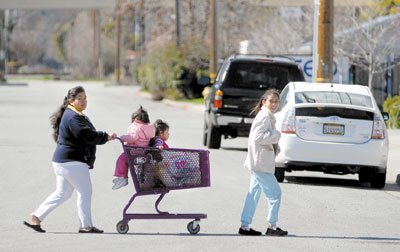Gilroy
– Grocers and other retailers will have to keep a tighter grip
on their shopping carts under a law winding its way through City
Hall.
Gilroy – Grocers and other retailers will have to keep a tighter grip on their shopping carts under a law winding its way through City Hall.
A call for better safeguards on carts is coming from Gilroy’s street maintenance workers, who find themselves retrieving abandoned carts several times a day from alleys, front lawns, sidewalks and vacant lots.
“The carts are all over the place,” said Carla Ruigh, Gilroy’s operations manager. “The city has to pick those carts up and either bring them back here to the Corporation Yard and have the stores pick them up, or return them ourselves. This is very costly to the public to have the staff constantly pick these up. And we can’t just leave them – they’re an eyesore.”
On Monday, Ruigh will pitch an ordinance to city council that would force local businesses to adopt anti-theft measures. Options range from hiring parking lot attendants to installing devices that prevent carts from leaving a store.
“There’s a number of different ways they can better handle their carts,” Ruigh said. “The main thing is we’re asking them to come up with a way to keep them out of the right-of-way or pick them up within 24 hours.”
An increasingly popular option locally is the “boot,” a radio-frequency-controlled wheel lock that triggers when a cart strays too far from a store. Safeway was among the first to adopt such a device, Ruigh said, and city officials required the “boot” as a condition of approval for the Wal-Mart Supercenter off Highway 152.
Because of the mandate, the city’s biggest retailer only loses about one or two carts a month, according to store manager Vernon Parker.
“I don’t know how much more they cost (than a normal cart),” Parker said. “Whatever it costs, it definitely saves us from having to go hunt them down.”
Nob Hill Foods on First Street has no safety devices, but its workers escort customers to their cars and return with the grocery carts. The store also does a respectable job of hunting carts down when they make it off site, Ruigh said.
The 99 Cents Only Store on 10th Street has proven a bigger problem, she added. The store’s bright purple carts have no safety devices and routinely crop up blocks from the store. On Friday, a cart bearing the distinctive 99 Cent logo stood in a bed of ivy on Montebello Drive – more than two miles from its home.
“Every time we order some they get lost,” said assistant manger Juan Zaragoza. “We usually go into the streets and pick them up … I don’t know about other stores, but we’re (getting the boot) because we’re getting a lot of carts stolen.”
About 20 carts vanish each month, he estimated, though he could not say how much the store pays for the carts. Premier Carts Inc., a Kansas company, sells shopping carts online for $108 each. At those prices, the 99 Cent Store in Gilroy is losing more than $2,000 a month.
Mayor Al Pinheiro pointed out that European stores have carts that require a coin deposit that can only be retrieved when the cart is returned. Other stores rely on alarm systems.
“We’re going to look into what the best policy is,” Pinheiro said. “We do need to fix that because we do see them all over town.”












